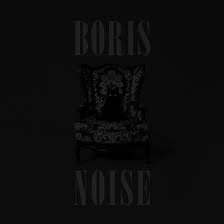When the first snippet of Boris’ 19th record surfaced earlier this year, it seemed to be a much more overtly melodic, even anthemic statement of desired accessibility than what has come before. And even though ‘Quicksilver’s melodic sections are bookended by the more comforting sound of plectrum-shredding and wide-eyed throat lacerations (not to mention a delightfully sludgy outro), it is a strange thing – in no way a failure, but odd that the choice to actively appeal to the ears is so pronounced. While it’s fair to say that some portions of the misleadingly-titled parent album, Noise, sound like a weird, boggy no-man’s land between Extreme Noise Terror and Ash, this is far more complex than the band simply "going emo".
Boris have been explicit about the way that Noise is a pick ‘n’ mix bag of what they see as their strongest idioms. "If we had to suggest just one album for those unfamiliar with Boris’ music, we will pick this for sure," they proclaim in the blurb that accompanies our copy, which is rather bullish. Judging from the exceptionally wide-ranging generic anchors scattered throughout the eight songs, Boris are in fact obscenely confident in their own ability. This panoply of styles is both the most impressive and the most frustrating thing about Noise, the result being that only at select moments do they approach the majesty, the fists-pounding-the-ground righteousness that many have come to associate them with.
Some of those select moments, though, are inarguably wonderful. Wata’s vocals on ‘Heavy Rain’ are sunshine through the dense, doleful cloud of gut-level guitars, the aforementioned outro of ‘Quicksilver’ will sound absolutely monstrous live, and the bleed into album-closer ‘Siesta’ is the only tonal shift that really works on the whole album. In fact, the second half of the record (weighted by the 19-minute tempo exploration ‘Angel’) is largely quite righteous, but the pitfalls that precede it are a little disappointing and unexpected.
The decidedly dude-ish, almost Hetfieldian groaning harmonies in ‘Vanilla’ and the half-finished electropop nothingness of ‘Taiyo No Baka’ are chief among the cringe-enablers, but the general air of "oh, we can tackle anything, we’re fucking Boris!" is the real culprit. Should they be chastised for attempting to make accessible a genre and approach that revels in difficulty? Was there any need to become more accessible? Didn’t 2005’s Pink prove that they could easily delight with sludge-pop riffs? It doesn’t matter: the point is that Noise isn’t their best work despite claiming to be exactly that.
Strangely, by aiming to deliver the definitive Boris album, that oft-promised but rarely-delivered musician’s guarantee, they’ve made something that doesn’t quite hang together. Noise‘s main function, aside from containing the odd glimpse of the thorough, consciousness-encompassing power that they’re capable of at their best, is merely to highlight how Boris are now only quite righteous. A career that has depended on continual, gentle evolution through some of the more challenging areas of experimental music has taken a bit of a toilet-break. Of course, even the most stupendous of bands take toilet-breaks in their careers and some of the results are not inconsiderable, but few bands will claim it to be their final destination.
<div class="fb-comments" data-href="http://thequietus.com/articles/15591-boris-noise-review” data-width="550">


